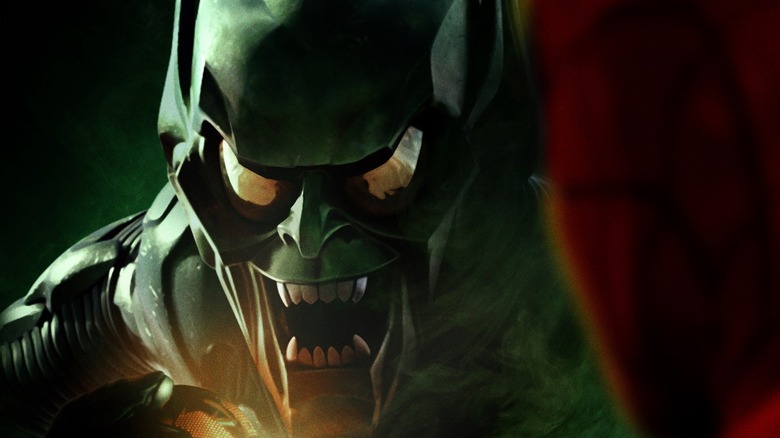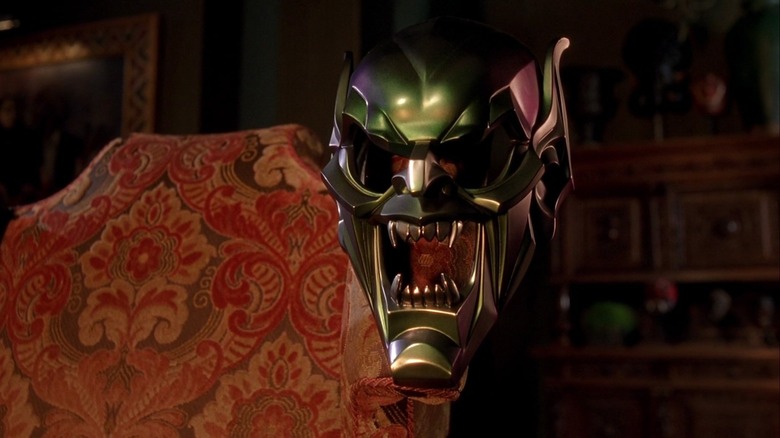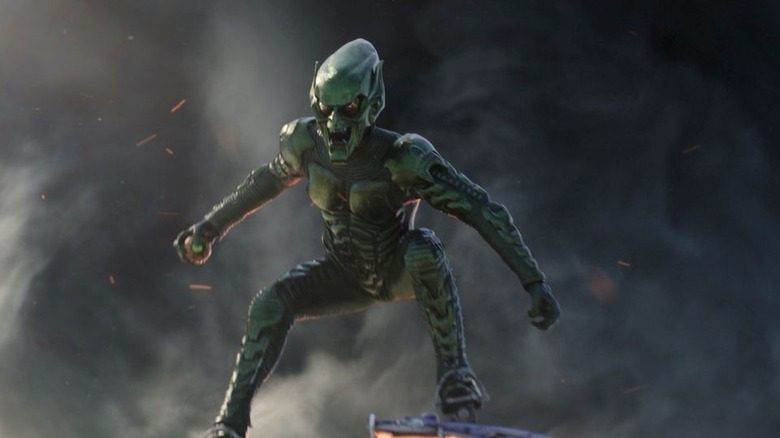Spider-Man: No Way Home Knows The Greatest Spidey Villain Is Willem Dafoe's Green Goblin
Warning: General spoilers for "Spider-Man: No Way Home" will follow.
In case it wasn't obvious before that the Marvel Cinematic Universe has been cursed with a villain problem, the release of "Spider-Man: No Way Home" indirectly turns that narrative into, essentially, actual MCU canon. I mean, what else would you call bringing back five villains from prior "Spider-Man" films — Rhys Ifans' Dr. Curt Conners/the Lizard, Jamie Foxx's Max Dillon/Electro, Thomas Haden Church's Flint Marko/Sandman, Alfred Molina's Dr. Otto Octavius/Doc Ock, and Willem Dafoe's Peter Osborn/the Green Goblin — to make up for the fact that Tom Holland's Peter Parker hasn't exactly faced any Big Bads who would pose a big enough threat for his third film? No disrespect to Michael Keaton's Adrian Toomes/Vulture or Jake Gyllenhaal's Quentin Beck/Mysterio but, frankly, the results speak for themselves.
From its very conception, "No Way Home" was written with the built-in admission that it would need to dip into Spidey's rogues gallery from two separate "Spider-Man" franchises entirely — Sam Raimi's "Spider-Man" trilogy and Marc Webb's "The Amazing Spider-Man" duology. Luckily for all of us, however, director Jon Watts decided to make the most of it, reminding audiences of the power that comes with focusing a surprising amount of the film on Dafoe's Green Goblin ... and also reminding us of what a truly committed villainous performance looks like when placed in the hands of a great actor who knows exactly what a role demands of him. You know what they say: if you can't beat 'em, crack open the multiverse and move heaven and earth in order to bring back the greatest Spider-Man villain to ever grace the silver screen.
The Legacy
Before Willem Dafoe's Green Goblin could go on to terrorize Tom Holland's Peter Parker in the MCU, director Sam Raimi first laid the foundation of this classic cinematic villain in 2002's "Spider-Man." The immense shadow that Norman casts over everyone — especially his own son, Harry (James Franco) — is palpable, setting the stage for the central role he plays in the story. Raimi mostly gives Dafoe two broad archetypes to play: the obsessive scientist who stops at nothing to succeed and, after his dramatic accident corrupts his mind with the Green Goblin persona, the vengeful supervillain driven by a pathological sense of superiority. Dafoe chews up the scenery as both sides of the character with reckless abandon and to spectacular results. At one point, his Green Goblin actually snarls "Hello, my dear!" to a helpless Mary Jane Watson (Kirsten Dunst) like some kind of demented fairy tale villain. It's awesome.
As Norman Osborn, Dafoe projects an overwhelmingly intense personality that makes him believable as a shrewd businessman, a potential father figure to Peter Parker (Tobey Maguire), and just a big ol' jerk to Harry and MJ. Some of the best moments in "Spider-Man" come when all of these clashing perspectives burst out at once, like the Thanksgiving dinner sequence at Harry and Peter's new apartment in the city. Coming at a crucial juncture of the film, viewers are preoccupied with the possibility that Osborn might discover Peter's secret identity as Spider-Man. In the midst of this dramatic conflict, the Goblin-influenced Dafoe sinisterly sharpens the carving knife, gives Peter nothing but piercing stares as he struggles to come to terms with what he already suspects, and wrathfully lashes out at Harry and MJ on his way out. It's goofy, hilarious, and somehow genuinely tense simultaneously ... all without Dafoe ever needing to affect his legendary Green Goblin voice.
Though newcomers to "Spider-Man" may get tripped up by Raimi's knowingly campy and shamelessly earnest tone, Dafoe's wide-eyed, manic performance goes a long way towards giving Maguire's "Aw shucks" Peter Parker a fittingly operatic threat. As the one outright villain to make his presence felt throughout each film in the trilogy, Raimi clearly understood the impact of Dafoe's singular take on the character. In retrospect, it's no surprise whatsoever that the MCU would pick up that torch and give him a main role in "Spider-Man: No Way Home."
The Man Behind the Monster
Consider us fooled!
With the trailers mostly focusing on the return of Doc Ock, it was only natural to assume that Alfred Molina would end up playing the role of the main antagonist in "Spider-Man: No Way Home." That sure seems to be the case when he becomes the very first multiversal villain to arrive on the scene after Doctor Strange's (Benedict Cumberbatch) spell goes wrong, wreaking havoc on that highway set piece heavily marketed in all the released footage so far. But a neat twist takes place soon after the Green Goblin's explosive arrival and immediate disappearance — the next time we see him, he comes to Aunt May (Marisa Tomei) for help as a broken and lost Norman Osborn. His death scene at the end of 2002's "Spider-Man" gave us one last glimpse of the man he used to be, begging Peter not to tell Harry about him. Here, we're treated to an extended sequence where he seems to put aside his Goblin ways and revert back to a much more chastened and regretful Norman.
Dafoe plays this with an extraordinarily deft touch, putting every intervening year since his last appearance as the character to good use and giving the impression of an older, tired man who's finally done with all this villainy. Holland's Peter is quick to trust him, putting his faith in an inherently optimistic worldview that argues in favor of the redemption of each and every one of the villains who've appeared on his doorstep. In classic Peter Parker style, however, this leads to tragedy and the death of Aunt May at Green Goblin's hands, putting Peter on the warpath against a villain who shouldn't even be his villain in the first place.
There's a moment during this set piece where Dafoe sheds all pretense of his "cowardly" Norman Osborn mannerisms and launches full-tilt into the unhinged Goblin, slipping back into the skin of the murderous sociopath as if he'd never left. Peter repeatedly punches him in the face, but to no effect. In fact, Dafoe's sh*t-eating grin only grows wider and wider until he gains the upper hand again. At that very instant, it's as convincing a case as any that there has never been a better, more committed villainous performance in the MCU than Dafoe's Goblin ... ironic as that is.
"Spider-Man: No Way Home"is currently playing in theaters.


